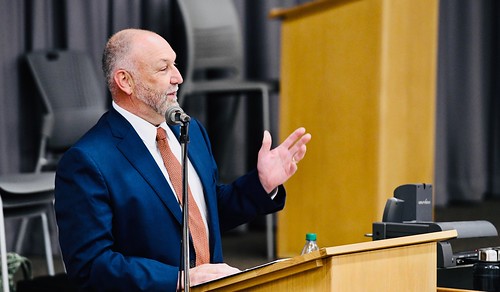Auburn University President Steven Leath outlines future Auburn initiatives in ‘State of the University’ address
Article body
Auburn University is on the move to new heights, with a goal to bolster its student experience and life-changing research and outreach.
Such vision for the future of Auburn was set forth Tuesday by Auburn President Steven Leath as he gave his “State of the University: Auburn on the Move” address as part of a University Senate meeting. The cornerstone to his presentation was rooted in the ways Auburn is heightening its already strong student experience – which Leath called the “crown jewel” of Auburn.
“Year after year, studies show that our students are satisfied with their choice after their first year at Auburn,” Leath said. “Our research also shows that they remain satisfied with their choice after graduation.”
With such success also comes challenges, the president said, and he detailed ways in which Auburn will address greater access to on-campus living spaces, limited parking and further enhancing campus safety. Leath said options are currently being examined for some potential new living spaces on campus, and possible parking improvements are also being studied. Security, he said, remains a key focus with several initiatives already having been enacted, most recently with Auburn’s recruitment of former FBI supervisory special agent Kelvin King to lead its campus safety initiatives.
“These efforts are critical to providing the best student experience in higher education, and ensuring that while here, our students are transformed from inquisitive scholars to engaged citizens,” he said.
Leath noted Auburn’s enrollment at 30,400 for the fall – the largest in the institution’s history – and that applications were up by 21 percent for the past year. He said Auburn educates more students from Alabama than any other university, with 60 percent of Auburn undergraduates being in-state students. Leath added that Auburn is committed to growing diversity and inclusion efforts and that Auburn will seize greater student access opportunities, to include dual enrollment, transfer and nontraditional students.
Along with the student experience, Leath focused on the expertise of Auburn’s faculty, saying the university’s professors are at the core of Auburn’s land-grant mission. He said a key focus will be in elevating the work and expertise of Auburn’s faculty to the national platform, growing awareness of their life-saving research and outreach.
“You are doing exceptional work at Auburn, and we want to ensure we seize every opportunity to tell your story,” he said to faculty in the room.
That work involves interdisciplinary discovery with Auburn’s scholars conducting meaningful research in such areas as additive manufacturing, cyber security, health and environmental sciences and scalable and renewable energy. The president said elevating such life-saving research is a key initiative for Auburn now and in the future. In June, the university furthered that effort with the announcement of its PAIR (Presidential Awards for Interdisciplinary Research) initiative, which invested $5 million in seed money to 11 interdisciplinary research teams. This fall, Auburn also welcomed 25 top-tier scholars through the Presidential Graduate Research Fellowship program.
“Our research and outreach efforts go where the tough problems exist, so we can effectively and efficiently unearth long-term solutions, meet real-life challenges and offer opportunity,” Leath said, adding that the university’s plan is to grow such work with the hiring of 500 tenure-track, research- and scholarship-focused faculty by 2022.
“We will hire in disciplines where need is great and demand is strong,” he said.
Leath likewise pointed out the great work of the Alabama Cooperative Extension among farmers and recent efforts in documenting crop loss in the Gulf following Hurricane Michael. Involving outreach, he mentioned the success of Auburn’s Rural Studio program, which aims to increase access to home ownership in underserved rural Alabama communities, and the life-saving work of the Obesity Working Group. He said outreach efforts also are taking place through new school partnerships in Alabama’s most underserved areas to assist with school performance and college readiness.
“We reach more than 20,000 people each year through Outreach’s continuing education initiatives,” he said.
The president then spoke about how Auburn is growing vital business partnerships with the likes of Boeing, NASA and Delta, saying “The investments we’re making today will allow us to collaborate with a broader range of organizations tomorrow.”
The president closed his address with a focus to the future, mentioning that Auburn is currently in the process of developing a strategic plan that will look 20 to 30 years out into the future.
“Our efforts take time and investment,” Leath said. “They take passion, imagination and creativity. It’s what’s required of us as a great university that’s striving to be greater, and we enthusiastically embrace this challenge.”
Related Media
Related Links
Media interested in this story can contact Communications Director Preston Sparks at (334) 844-9999 or preston.sparks@auburn.edu.
Auburn University is a nationally ranked land grant institution recognized for its commitment to world-class scholarship, interdisciplinary research with an elite, top-tier Carnegie R1 classification, life-changing outreach with Carnegie’s Community Engagement designation and an undergraduate education experience second to none. Auburn is home to more than 30,000 students, and its faculty and research partners collaborate to develop and deliver meaningful scholarship, science and technology-based advancements that meet pressing regional, national and global needs. Auburn’s commitment to active student engagement, professional success and public/private partnership drives a growing reputation for outreach and extension that delivers broad economic, health and societal impact.





